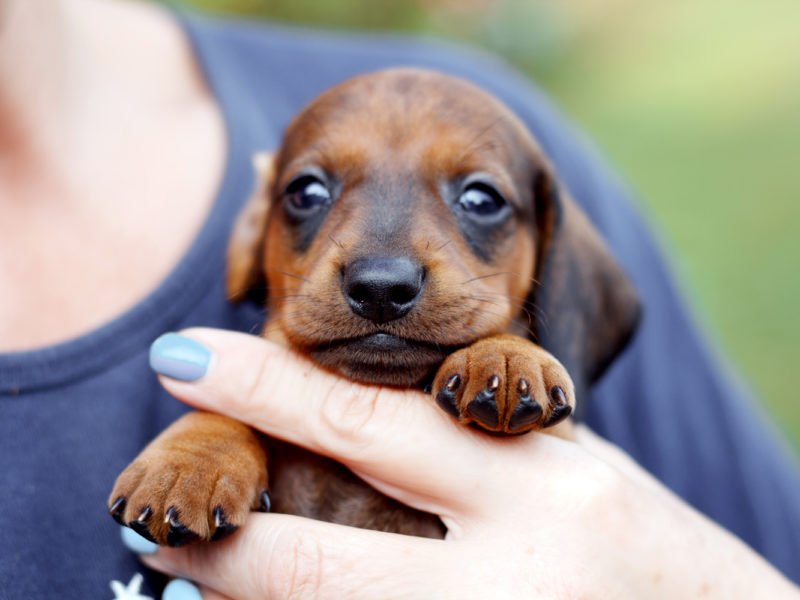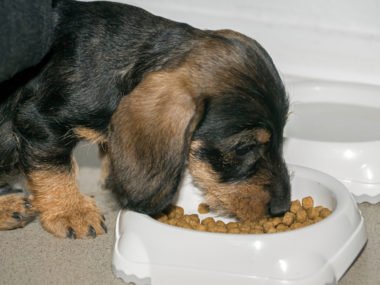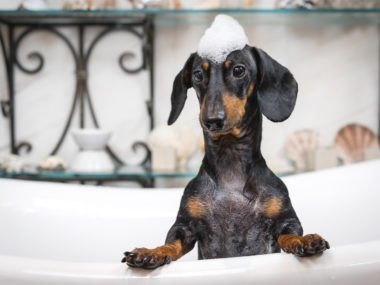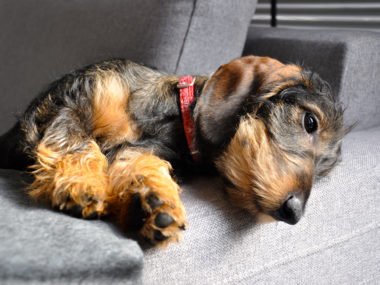Are you thinking of getting a dachshund puppy or adopting a young dachshund? Are you wondering what you’ll need to buy? What else you need to think about? And where you start with it all? We’re going to give you tips and advice on what you need to do and things you should buy to care for your new dachshund.
How to care for a dachshund. This is how to care for a dachshund:
- Buy your dachshund the essentials (bed, food, lead, collar etc.)
- Make sure he’s microchipped and vaccinated
- Feed him at least twice a day (3 times for pups)
- Let him out for a wee every few hours (every 30 mins for pups)
- Exercise and play with him every day (5 mins per month of age for pups)
- Keep him clean and groomed
- Give him lots of love
Read on to find out what you need to think about before you get a dachshund, what essentials you need to buy, what you should do when you first bring him home, and what to expect in the first few weeks and months.
Table of Contents
- What do I need to do before I get a dachshund?
- What do I need to buy for my dachshund?
- What do I ask when I collect my dachshund?
- What do I do when I bring my dachshund home?
- Is it hard to look after a dachshund puppy?
- Is it hard to look after a dachshund?
- What should I expect when I first get a dachshund?
- What should I expect a few months after getting a dachshund?
What do I need to do before I get a dachshund?
This is what you need to do before you get a dachshund:
- Do your research
- Ask permission from your landlord or management company
- Think about other pets
- Make sure someone is home or calls in during the day
- Be mindful of allergies
- Pre-plan holidays
- Consider neighbours
- Puppy-proof your home
This is what you need to do:
Do your research
Doing research before you get your dachshund is hugely important, as there are lots of unscrupulous breeders out there. Buying cheap dachshunds online or in rare colours is a complete no-no! Only get a dachshund from a registered breeder or reputable rehoming charity and meet at the registered address – not in some other location.
Ask to see the puppy’s mother and father. Mum should interact with the puppy and you should be able to see them together. If the father was a stud dog, ask questions about him too. Ask for the registration numbers of both parents so you can check them with the official Kennel Club.

Take a look at the general environment and look to see where all the puppies have been sleeping. Ask whether the puppy has been exposed to normal household noises such as hoovers, washing machines, TVs and so on. Does the puppy have toys and things to play with? Does the puppy look to be part of a loving, caring home? Go with your gut instinct and, if something doesn’t feel right, walk away.
Make sure the puppy looks healthy before you agree to take him or her home. Ask about any medical information you should be aware of, such as history of Intervertebral Disc Disease (IVDD) in his or her parents. If you’re getting a ‘miniature dachshund’, you need to be sure both parents are PRA clear (Progressive Retinal Atrophy is an inherited eye disease). And, if the miniature is ‘wire-haired’, you ALSO need to check the puppy has been tested for Lafora disease (Lafora is an inherited type of epilepsy that leads to seizures).
Don’t bring a new puppy into your home until they’re at least 8 weeks old. Taking a puppy away from its Mum before 8 weeks is too early. They need to learn from their Mum and siblings in those first 8 weeks and any responsible breeder would know this.
Ask permission
Are you allowed pets in your home? If you’re renting, you’ll need to get written permission from your landlord or management company to have a dog. Don’t try and keep him a secret – you’ll get found out sooner or later and could be asked to move out.
Think about other pets
If you already have pets, will they be ok with a new dog? And will your new dachshund be ok with your pets? You should only ever bring a new dog into your home if you’re sure everyone will be able to cope. This is especially important when you’re adopting a rescue dog. If you decide to go for it, you’ll need to introduce the new dachshund to your other dogs or cats properly – here’s how you introduce them to cats and here’s how you introduce them to other dogs.
Another thing to think about before bringing a new puppy into your home, is making sure any existing pets are also up to date with their vaccinations.
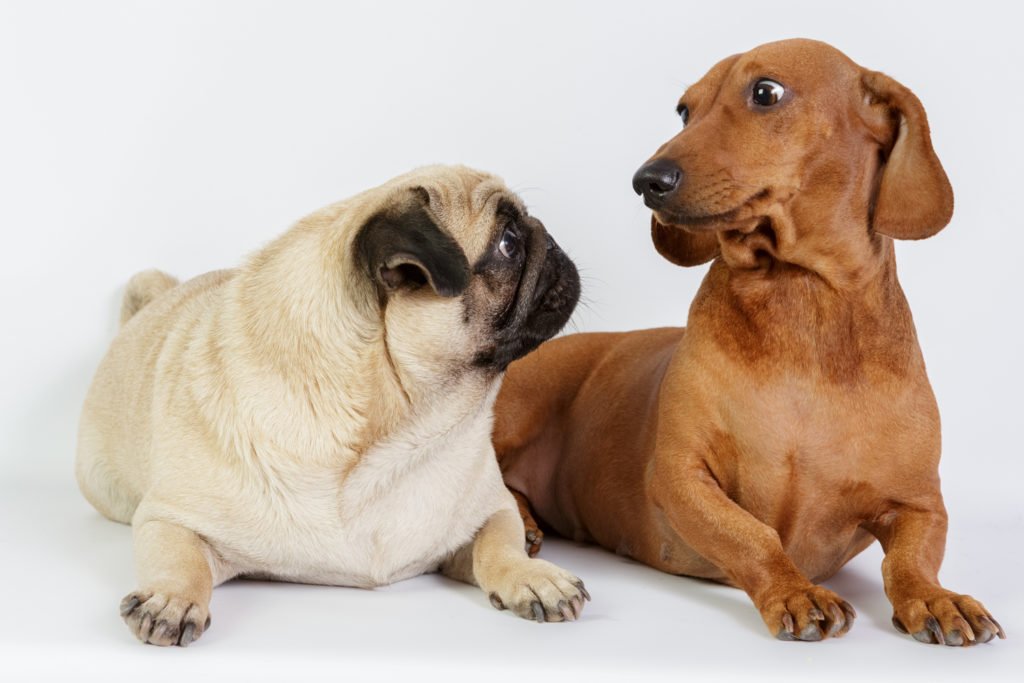
Make sure someone is home or calls in during the day
Dachshunds are happiest being around people and shouldn’t be left alone too long while you’re at work (this is especially important for very young pups). So if you’re not home during the day, either you, or someone you know, need to pop in every few hours to let your dachshund out. You might have family or friends who could look after him during the day or you could hire a dog sitter or dog walker to check in on him. Leaving a dachshund alone too long could lead to separation anxiety, excessive barking or destructive behaviours. Having said that, some adult dachshunds do fine on their own, so it does depend on the individual dog.
Be mindful of allergies
If you have allergies to dogs, make sure you know if you’re allergic to the dachshund you’re getting before you bring him home. Dachshunds can get very attached, very quickly, and it would be very unsettling to have to rehome him again. The wire-haired dachshunds with ‘pin wire’ coats are the best option from a shedding point of view and may be the best choice for allergy sufferers. But, if anyone in the family has severe allergies to dogs, don’t rush the decision. Spend plenty of time with the dachshund and see how things go. If anyone struggles with allergies or reactions, it may not be sensible to take him on.
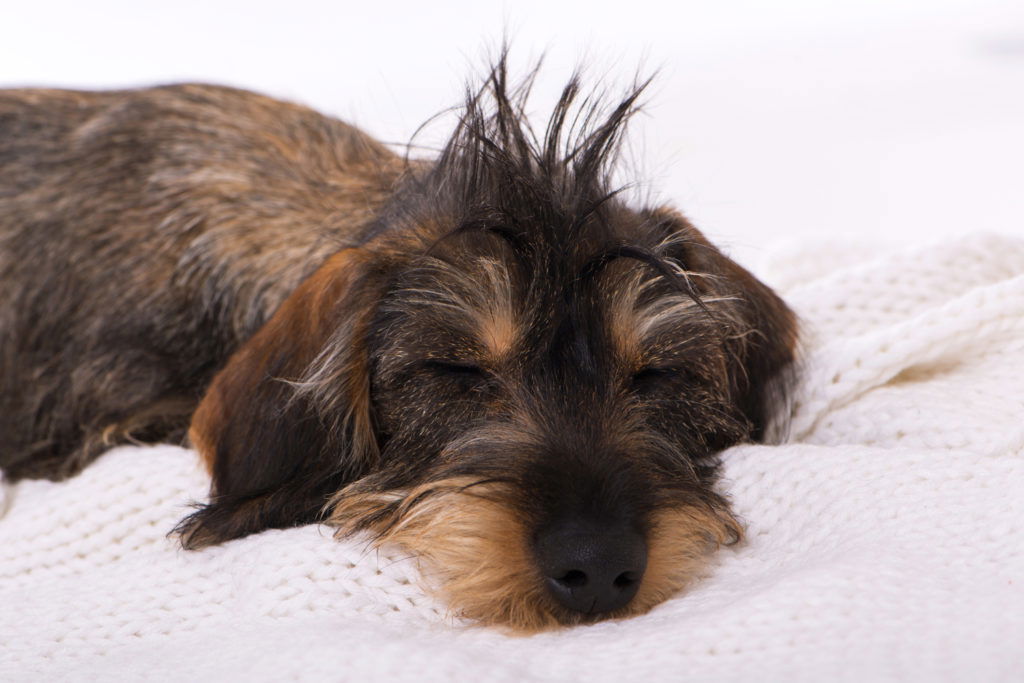
Pre-plan holidays
Where will your dachshund stay if you go abroad on holiday? Family or friends would be the best option, as your dachshund will already know them. If not, try doggy daycare as some allow boarding for holidays (make sure they’re licensed). Another idea is to join a local dachshund Facebook Group, and ask for recommendations. Because of their back problems, it’s always a good idea to leave your dachshund with someone that understands the breed.
Consider neighbours
Dachshunds are territorial and love to bark – it’s in their nature. And this can be a problem if you have neighbours living close by. So work on his barking from day one. Don’t leave him unsupervised in the garden and try to control the barking indoors by training him – here’s how you do it.

Puppy-proof your home
Make sure anything that could be toxic is out of reach, and things like cables, shoes, handbags and any other chewable or valuable items are packed away and out of sight! Dachshunds love to chew and need to be trained to understand what’s theirs and what’s not!
What do I need to buy for my dachshund?
This is what you need to buy for your dachshund:
- A bed
- A lead
- A collar and ID tag with your contact details
- A harness (if you’re using one)
- Food (raw, dry or wet)
- Treats (useful for training)
- Bowls for food and water
- Poo bags (ideally biodegradable)
- Flea and worming treatments
- A crate (if using for potty training)
- A blanket to snuggle up in (dachshunds LOVE to burrow)
- Dog shampoo and conditioner (ideally natural and chemical-free)
- A ramp (if you want your dachshund on your sofa and bed)
- Grooming tools like brushes, scissors and wash cloths (optional)
- A doggy toothbrush and doggy toothpaste (optional)
- Dog toys (dachshunds love balls and squeaky toys)
- Rubber gloves (for mucky clean-ups!)
What do I ask when I collect my dachshund?
This is what you ask when you collect your dachshund:
- Ask for the paperwork
- Ask about pet insurance
- Ask about vaccinations
- Ask if your dachshund has been microchipped
- Ask about flea and worming treatments
- Ask for something that smells of your dachshund’s Mum
- Ask what food your dachshund is currently eating
- Ask about your dachshund’s temperament
- Ask about your dachshund’s health history
This is what you need to know:
Ask for the paperwork
Ask for the ‘pedigree certificate’ and ‘Kennel Club registration certificate’ (or your own country equivalent) from your registered breeder, so you can organise the transfer of ownership. Also, ask for a receipt for your dachshund as you’ll need this to change the microchip details. Rehoming centres might not have any paperwork for their rescue dogs but it’s worth asking what they do have.
Ask about pet insurance
Ask if the puppy is currently insured? You generally get a few weeks (normally about 5 weeks) free pet insurance from your breeder. Don’t wait for this insurance to run out before you organise your own. Pet insurance companies don’t cover you for claims in the first 2 weeks, so make sure your new insurance is in place 2 weeks before the breeder’s insurance runs out.
Ask about vaccinations
Ask for your dachshund’s vaccination certificate (if he’s a pup, he may not have had his jabs yet). You need to show this to your vet at the first check-up appointment. If he’s had his first jabs, make sure you organise the second jabs exactly 4 weeks after the first. If you go over the 4 weeks, you’ll have to restart and have the first jabs again. Make this a priority as the jabs can be quite tough on a dachshund pup and you don’t want to have to repeat them if it can be avoided.

Ask if your dachshund’s been microchipped
Ask whether your dachshund has been microchipped. If he has, ask if the chip has been updated with your details. If he hasn’t, you need to book him in to get this done ASAP.
Ask about flea and worming treatments
Ask how long ago he was wormed, and if and when he had his last flea treatment, so you can note down the dates and keep everything on schedule.
Ask for something that smells of your dachshund’s Mum
Ask to take something home that smells of your dachshund’s Mum. This’ll really help your puppy settle into his new home. It could be a toy or blanket, for example, covered in her scent. If you’re crate training, you could put this in with your puppy at night to give him some extra comfort and reassurance.
Ask what food your dachshund is currently eating
Ask what food your puppy is currently eating and at what times of day. The breeder may give you some food to cover you for a few days until you stock up. You don’t want to make any sudden changes to diet right away as that can give puppies an upset tummy. It’s better to let your puppy settle into his new home first. Keep feeding the same food as the breeder and phase it out slowly.
Ask about your dachshund’s temperament
Ask about the temperament of your dachshund so you can spot any changes in his energy and personality once he’s settled into his new home. Rehoming centres might not have much information about their rescue dogs, but it’s definitely worth asking what they know and have observed.
Ask about your dachshund’s health history
This should have been done when you were doing your research but, just to recap, ask about any medical information you should be aware of, such as history of Intervertebral Disc Disease (IVDD) in his parents. If you’re getting a ‘miniature dachshund’, you also need to be sure both parents are PRA clear (Progressive Retinal Atrophy is an inherited eye disease). If the miniature is ‘wire-haired’, you ALSO need to check the puppy has been tested for Lafora disease (Lafora is an inherited type of epilepsy that leads to seizures).

What do I do when I bring my dachshund home?
This is what you need to do when you bring your dachshund home:
- Book a check-up
- Get pet insurance
- Organise flea and worming treatments
- Find out about the annual booster
- Stock up on food
- Get out for daily exercise
- Keep on top of grooming
- Start dog training
This is what you need to know:
Book a check-up
Register with your local vet and book a check-up. They’ll check your new dachshund over, give you advice on flea and worming treatments, and talk to you about vaccinations. Take all your paperwork with you so you have all the dates and information to hand.

Get pet insurance
Pet insurance is expensive but it’s also really important. Dachshunds are prone to back problems and any scans or surgery that’s needed will run into thousands. Make sure you get ‘lifetime cover’ for any pet insurance you choose.
As mentioned before, you’re generally given a few weeks free pet insurance from your breeder. Don’t wait for this cover to run out before you organise your own. Pet insurance companies don’t cover you for claims in the first 2 weeks, so make sure your new pet insurance is in place 2 weeks prior to the breeder’s insurance running out.
Organise flea and worming treatments
Speak to your vet about flea and worming treatments and make a note of the dates in your diary. It’s best to buy the treatments directly from your vet, and not online where you may find them cheaper. This is safer because you then know the treatments are legit. Also, some pet insurance companies have changed their policies so that, if you don’t, you won’t be covered under your pet insurance for any related health issues (read the small print!).
Find out about the annual booster
Put your dachshund’s annual booster jab date in your diary (if he’s a pup, your vet will advise you on what vaccinations your dachshund needs during your first visit). If he isn’t kept up to date with his jabs, he may not be covered under the pet insurance.
Stock up on food
Get familiar with your dachshund’s feeding requirements and times, and stick to them! Adult dachshunds need two meals a day and puppies need three or four while they’re still developing.
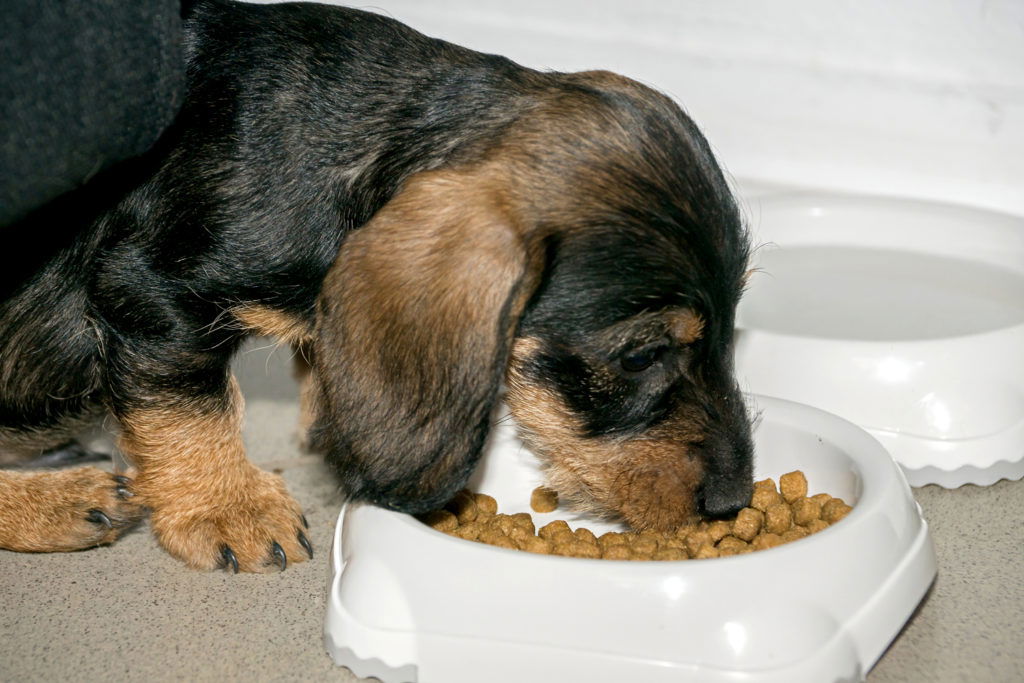
Get out for daily exercise
Work out your dachshund’s exercise schedule, and stick to it! Dachshunds don’t need loads of exercise, but they do need to do something every day. For puppies, stick to the ‘5 minutes per month of age’ rule (up until they’re 12 months old). So a 12 week old puppy would need just 15 minutes of exercise per day (3 months x 5 minutes = 15 minutes). Adult Miniature dachshunds need at least 30 minutes of daily exercise and adult standard dachshunds need 60 minutes or more.
Keep on top of grooming
Get familiar with your dachshund’s grooming requirements. What you need to do will depend on the type of dachshund you have. If you need to bathe your pup, make sure you use a gentle, natural dog shampoo.
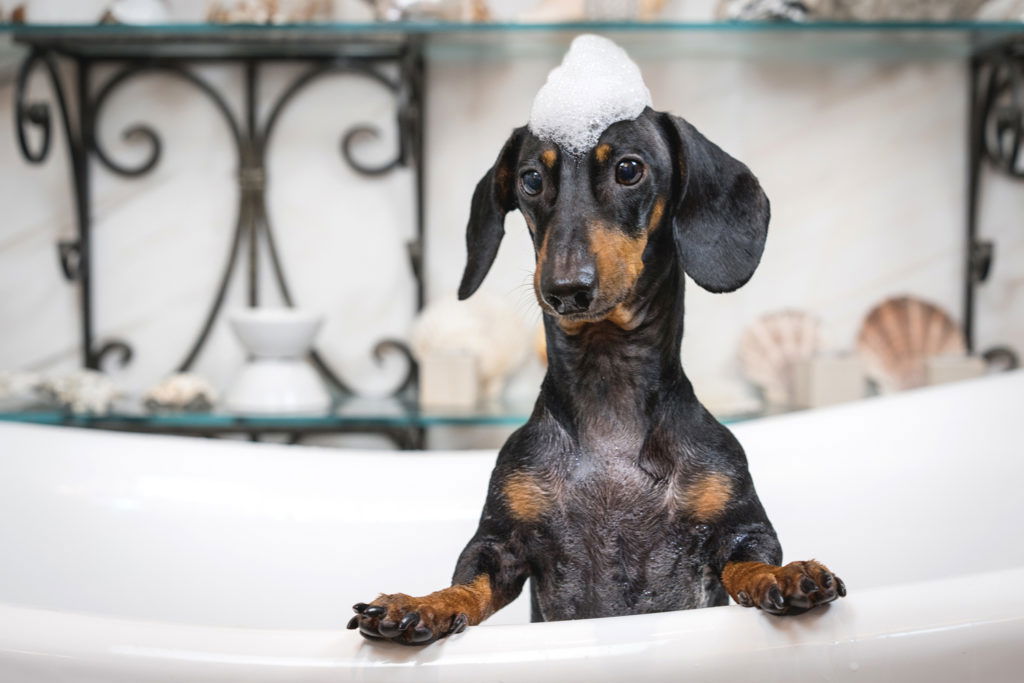
Start dog training
Start thinking about your dachshund’s training schedule and set boundaries from the beginning – if you don’t want him to go on your bed or sofa, for example, you need to let him know from day one.
Is it hard to look after a dachshund puppy?
Yes. If you get your dachshund as a puppy, you’ll have to go through the normal stresses of potty training, learning boundaries and teething. You must be willing to spend time on training because dachshunds are stubborn and it can take time to learn.
Dachshund puppies can be hard work and it can be tiring too. One of the biggest challenges is potty training as it can take a while for them to pick this up. But as long as you dedicate enough time to helping him learn, he should soon get the hang of it. Dachshunds like to push boundaries so training is something that’ll be ongoing and take time, patience and consistency.
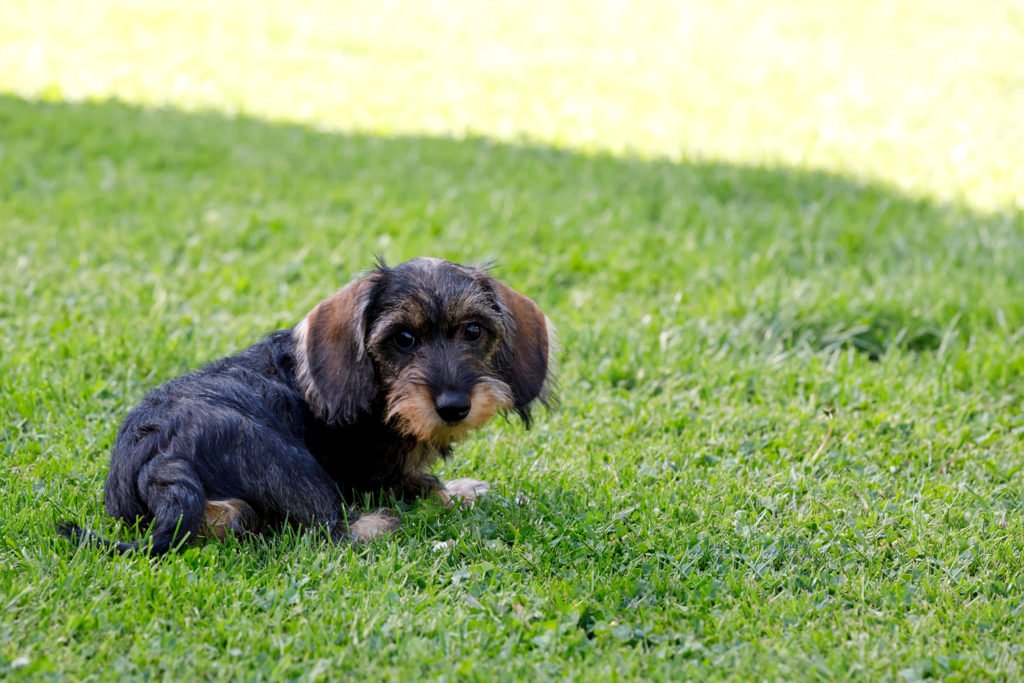
You’ll also need to keep your dachshund up to date with his jabs, flea and worm treatments, feed him the right amount of food while he grows, groom him every few months and make sure he gets the right amount of exercise and playtime for his age.
If you’re not home for much of the day, a dachshund puppy might not be right for you. As pack dogs, dachshunds love company and being around people. Leaving a puppy for hours on end when they’re very young could cause problems with barking, anxiety or destructive behaviours. It’s better to know this about the breed before you get a new puppy. Having said that, if you can get someone to pop in and help you out, you can definitely make it work!
Is it hard to look after a dachshund?
No. Dachshunds are fairly low-maintenance, as long as you spend time on training when you first bring them home. They don’t need huge amounts of exercise and will happily sleep 12–14 hours a day. They’re big barkers, but you can train them to turn the volume down a bit!

Adult dachshunds are fairly easy to look after. You just need to stock up on the essentials, keep him up to date with his jabs, flea and worm treatments, feed him the right amount of food, groom him every few months and make sure he gets enough exercise and playtime. On top of that, give him lots of love, fuss and attention!
If you’re away from home for more than 6+ hours a day, a dachshund might not be the right breed for you. Dachshunds are sociable dogs that love having people around. Leaving your dachshund while you’re at work all day could cause problems with barking, anxiety or destructive behaviours. Not all dachshunds struggle with being on their own and some will happily sleep, but it’s better you know this about the breed before you bring one into your life.
What should I expect when I first get a dachshund?
Your dachshund may be nervous and unsettled for the first few days, so give him space and time to get used to his new home. Be there for him, but don’t overwhelm him with cuddles and commands. As he starts to settle and relax, he’ll soon come out of his shell.
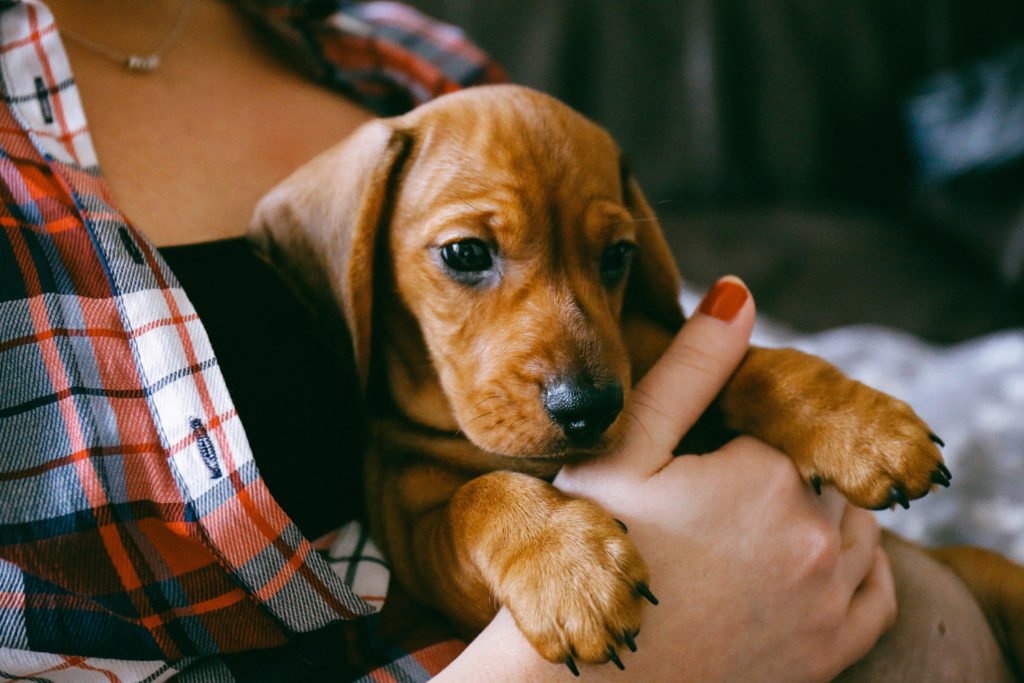
Sleep
You might have a restless few nights after your dachshund arrives. He’ll be scared and confused. He might howl, bark or whine loudly. To help him feel safer, put his crate in your bedroom and make it really comfy, with lots of blankets. Leave a night light on so it’s not too dark. And when he fusses, reassure him calmly and gently, but don’t make a big deal of it. He’ll soon settle down.
Accidents
One thing to be prepared for is accidents. It’s normal for dachshunds to wee or poo in the house after a big move, whether they’re puppies or adults. Just stay calm, clean it up and keep working on his potty training.
Food
If you’ve changed his diet from what he was eating before, he might have a runny tummy for a few days too. If you can, buy the food he’s used to and slowly phase it out by gradually introducing the new food.
Boundaries
Your dachshund may also start to push boundaries, so decide early on what you’ll allow him to do and what you wont. That adorable little face starring at you will be so persuasive. But, if you don’t want him on the bed or sofa, start as you mean to go on. Schedules and routine are so important for training and will really help you in the long run.
What should I expect a few months after getting a dachshund?
Over the next few weeks and months, puppy dachshunds will start teething and chewing and this can go on for about 8 months. You’ll also have to think about neutering.

Your puppy’s last vaccination booster is at around 14-16 weeks (check dates with your vet). A few weeks after this you’ll be able to get out and about with your adorable dachshund pup. You can go for short walks in the local park and start socialising him with other dogs and people. Just make sure you don’t over-exercise him until he’s fully grown. Stick to the ‘5 minutes per month of age rule’ until he’s 12 months old.
This is a lovely stage because you can watch as your dachshund explores his new world and becomes an integral part of your family. In time, you can even join dachshund Facebook groups with monthly sausage dog meet ups and walks.
The first few weeks and months can be tiring and sometimes really hard work. But dachshunds are SO worth it. They’re bursting with personality and will fill your home with fun and laughter. They’re the comedians of the dog world and have so many amazing traits.
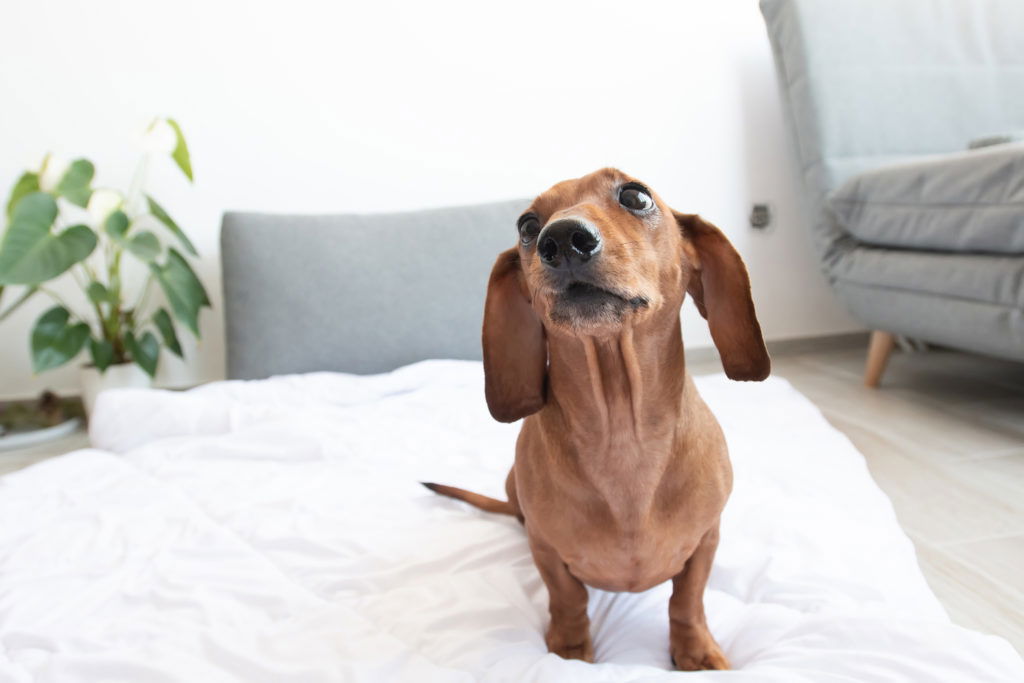
So, there you have it. Dachshunds are easy to care for but you will need to buy a few essentials for their daily needs (bed, food, bowls, toys etc.) They need to be microchipped and vaccinated, fed at least twice a day (3 times for pups), let out for a wee every few hours, walked and played with every day, kept clean and groomed and given lots of love. And in return, they’ll give you everything back and more! 💕

